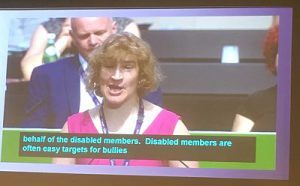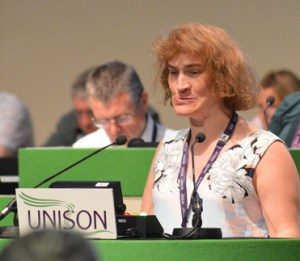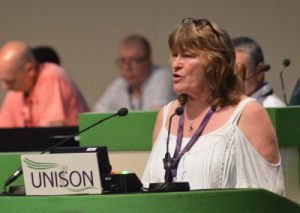18th-19th June in Brighton
Here we keep you up to date with Branch involvement in Local Government conference as it happens
UNISON calls for zero tolerance on bullying and harassment

Delegates at Local Government Conference heard harrowing accounts of bullying at work from a range of members and activists and backed a complete zero tolerance on bullying and harassment and actions to eradicate it.
Building on the work of Scotland young members in their “Gonnae no dae that” campaign, the National Young Members Forum had conducted their own survey and found high levels of bullying, some of it requiring medical treatment. And this is not confined to young workers – women, Black, disabled and lesbian, gay, bisexual and transgendered members are also disproportionately likely to experience bullying and harassment at work.
Scotland’s Kathleen Kennedy spoke as National Disabled members’ rep and brought a focus on the bullying experienced by disabled members.
“Disabled Members are often seen as easy targets for bullies,” said Kathleen, adding “Disabled Members don’t always realise when they are being bullied which makes us vulnerable if people want to take advantage of us.”
She pointed out that things can be made worse because disabled members are sometimes frightened complain because they think it might make things worse.
“This fear is often based on their experiences at school or in the workplace when they reported bullying but were not believed or taken seriously,” Kathleen warned.
She called for guidance to include information so all stewards and activists know how to support disabled members who may need more help than non-disabled members.
Apprenticeship Charter must take account of disability issues

Local Government Conference backed a National FE & 6th Form Colleges Committee call for measures to ensure that apprentices are well supported, have proper contracts of employment and get the rate for the job, are not used as cheap labour and get a job at the end of it.
The SGE will update recruitment materials and the negotiating guide, and an amendment from Derbyshire County also means that an Apprenticeship Charter will be drawn up to give apprentices security and protection in the workplace and the opportunity to join a Trade Union.
Aberdeenshire Branch equalities officer, Kathleen Kennedy supported the amendment and the motion on behalf of the National Disabled Members committee and told delegates that this issue is really important to Disabled Members.
Kathleen said, “Apprenticeships can be a good way of getting a job, but disabled people often find it really hard to get an apprenticeship because employers want to have to make reasonable adjustments for an apprentice.
“So we are really pleased that the motion talks about equal opportunities and Special Educational Needs.
“But if we are to improve disabled people’s chances of getting an apprenticeship we can’t just talk about it. We have to take action,” urged Kathleen.
“We really like the idea of an Apprenticeship Charter,” she added but called on the SGE to make sure they include disabled people’s issues when they are drafting the charter.
Bring home care back in house now

Local government delegates heard harrowing stories about the state of home care in the UK as it called for councils to sign up to UNISON’s Ethical Care Charter and for Labour to pledge to bring the service back in house.
And Labour councils should not wait for a Labour Government before stopping privatisation and putting an end to zero hours contracts.
Home care workers spoke of long hours in privatised companies, of visits to vulnerable people of as little as two minutes and a Sevacare worker spoke of earning just £3.75 an hour.
One was reduced to tears as she spoke about the challenges of the job, being subject to abuse by some service users, with no understanding from management and at the end of the day – poverty pay.
Aberdeenshire’s Kate Ramsden told delegates they are lucky in Aberdeenshire that home care services are delivered primarily in-house
“As a branch we have worked very hard to keep them in-house but we’re not complacent”, she said, “And we’re watching the new Health and Social Care partnership very carefully to make sure that they don’t seize on any opportunity to privatise.”
In-house services home care services are well valued by the community they serve.
“And our home care members work hard to provide a high quality service and do their best to challenge any attempts to compromise that”, added Kate.
“That’s not to say things are perfect. Our members still tell us about 15 minute sessions, without the time needed to do what’s required and no time at all to chat with the service user even though they may be the only person they will see that day, or week even.
“And they have no base for a cup of coffee or a pee for that matter having to use the local Tesco store. We’re working on that one!”
Despite the Scottish Government’s commitment – even backed up by cash – to ensuring that services commissioned by Scottish councils are paying staff the Scottish Living Wage, the council, despite warm words, has still not signed up to the Ethical Care Charter
“But at least we can take up issues on behalf of our home care members. At least we can call on the council and the Health and Social Care Partnership as the employer to step up to the plate and address these issues.
“Much harder when you are dealing with a private for profit firm!”
In-house home carers enjoy far better pay, conditions and support than their colleagues who are outsourced and as a result they can provide a far better service to their vulnerable service users and have more confidence to advocate on their behalf.
Calling on the Labour Party to pledge to bring these services back into house where they are subject to democratic accountability, she said: “Of all services, those to our most vulnerable citizens should always be about people not profit.
To applause, she added: “And if railways can be renationalised then surely home care services can be too.”
Service group conferences bring together members across the country doing similar kinds of jobs or working for the same kinds of employers. Our branch’s service group is local government. It has its conference just before the National Conference and in the same venue.
The delegation
The branch is entitled to send three delegates to this conference and must have regard to proportionality in line with the gender balance etc in the branch. We tend to have the same delegation as the Delegate Conference because of the distance to travel and the fact that one conference follows on from the other.
The Branch delegation to this year’s Local Government Conference in Brighton was agreed at the Branch Committee.
 |
 |
 |
 |
| Kate Ramsden, Branch Chair and Comms Officer |
Ann Gray, Steward and Treasurer | Brenda Richmond, Steward, Cornerstone | Morag Lawrence, Newssheet editor and education officer |
 Regional Delegates: Two regional delegates are elected each year from the Scottish Local Government Committee. They speak to Scotland’s motions and amendments and they keep Scottish delegates right about conference matters. We are very pleased that for the seventh year in a row, our branch secretary, Inez Teece has been elected as regional delegate, along with Scott Donohoe, from Glasgow Branch.
Regional Delegates: Two regional delegates are elected each year from the Scottish Local Government Committee. They speak to Scotland’s motions and amendments and they keep Scottish delegates right about conference matters. We are very pleased that for the seventh year in a row, our branch secretary, Inez Teece has been elected as regional delegate, along with Scott Donohoe, from Glasgow Branch.
 Service Group Executive (SGE): Assistant Branch Secretary, Susan Kennedy is an elected member of the ruling body for UNISON’s Local Government Service Group, and she will take her place on the stage during this conference and will speak on behalf of the SGE. We wish Susan well for her fifth conference in this role.
Service Group Executive (SGE): Assistant Branch Secretary, Susan Kennedy is an elected member of the ruling body for UNISON’s Local Government Service Group, and she will take her place on the stage during this conference and will speak on behalf of the SGE. We wish Susan well for her fifth conference in this role.
 National Disabled Members Committee: Kathleen Kennedy, our branch equalities officer will be attending Local Government Conference to represent disabled members across the UK. This is the first time Kathleen has been elected to this role and we wish her well.
National Disabled Members Committee: Kathleen Kennedy, our branch equalities officer will be attending Local Government Conference to represent disabled members across the UK. This is the first time Kathleen has been elected to this role and we wish her well.
Motions
Motions are passed by a straight majority of the conference delegates on a hand vote. If it is close, conference delegates or the chair of conference can call for a card vote. The number of card votes per delegation is based on the number of members in the branch.
Our branch did not submit any motions to Local Government Conference this year.
As delegates we will vote on the motions and the rule changes in line with branch policy, where we have that in place and we can speak for or against any of the motions, amendments and rule changes.
